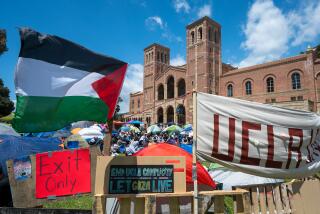Concerns Raised Over Protecting Poor Communities
Legal challenges to the Long Beach Freeway project and Los Angeles International Airport expansion, as well as a court order requiring the Metropolitan Transportation Authority to improve bus service for poor and minority riders, have been put under a cloud by this weekâs civil rights ruling by the U.S. Supreme Court.
In particular, the opinion was a blow to the environmental justice movement, which had racked up some some notable victories, both locally and nationally.
Attorneys said they fear that Tuesdayâs decision may turn back 30 years of developing case law protecting the rights of minorities whose neighborhoods suffer a disproportionate share of environmental damage caused by polluting industries.
âThis decision is a major blow to the abilities of communities to protect their environment,â said Angela Johnson Meszaros of the California League of Conservation Voters.
Meszaros and others have based their cases on Title VI of the 1964 Civil Rights Act, which prohibits the expenditure of federal funds on programs that discriminate on the basis of race or national origins.
But under Tuesdayâs Supreme Court ruling, plaintiffs can no longer sue agencies for policies that have a discriminatory impact. They must show that the discrimination was intentional, which lawyers say is far more difficult to establish.
Meszaros, one of the attorneys who filed suit against the state on behalf of Latino residents of El Sereno who live in the path of the proposed Long Beach Freeway extension, said she fears that the decision may force their suit out of court, along with many others.
âWe may no longer have a cause of action to put before a federal court,â said Meszaros, who plans to meet with other attorneys to develop strategies to cope with the decision.
The Long Beach Freeway suit was filed on behalf of El Sereno residents who claim that they would suffer a disproportionate share of environmental damage caused by the proposed 6.2-mile freeway extension.
Among the issues: allegations that the mitigation plans put forward by the California Department of Transportation would provide greater benefits, such as underground tunneling, to the mostly white communities of South Pasadena and Pasadena. South Pasadena has filed a separate suit to stop the project.
Meszaros said that if legal redress in the courts is shut off, residents in communities such as El Sereno would have to take their complaints to administrative agencies. But those same agencies gave El Sereno residents so little satisfaction that the lawsuit was filed, Meszaros said.
Jerilyn Lopez Mendoza of the nonprofit Environmental Defense, an attorney who had been researching an environmental justice suit against LAX, called the opinion âdevastating.â
âItâs going to have major ramifications, particularly on LAX,â she said.
Opponents of the Los Angeles airport plan, including Rep. Maxine Waters (D-Los Angeles), zeroed in on environmental studies that said noise and air pollution problems resulting from airport expansion would have the biggest impact on minority and low-income residents of Lennox, Inglewood and other areas east of the airport.
Before the Supreme Court ruling, Waters had called the airport âripeâ for an environmental justice lawsuit.
Until Tuesdayâs decision, momentum on such lawsuits had been growing in favor of plaintiffs, a trend that civil rights attorneys applauded but which created extraordinary concerns among planners of major airport, rail and highway projects.
Environmental justice issues have also been raised against airports in Boston, Phoenix and Atlanta.
Planners hoping to build new runways, rail lines and freeways were being forced to give intense scrutiny to each projectâs impact on low-income and minority communities and then face lawsuits if a disproportionate share of the environmental damage fell on those communities.
In the master plan for expansion of LAX, for example, 50 pages were given over to describing explicitly how the project would affect air quality, noise and traffic in minority and low-income communities.
In putting together the LAX plan, the city brought in two prominent civil rights attorneys, Connie Rice and Robert Garcia, to work on a special task force to mitigate environmental damage created by modernization of the airport.
More than $400 million has been allocated to offset noise problems. Jobs were promised to minority groups. Over the last five years, more than 125 meetings were held with minority and low-income groups that would be affected by the airport plan.
One of the most important cases so far dealing with Title VI involved the suit by the Bus Riders Union against the MTA alleging discriminatory policies. The suit led to a landmark consent decree requiring the MTA to improve its bus system and pay far more attention to the needs of minority riders.
The consent decree is binding on the MTA, but Eric Mann, a union leader, said he is concerned by possible ripple effects of the Supreme Court decision.
One reason for his worry is the MTAâs appellate court appeal of a lower court interpretation of the consent decree.
âThe appeal is very dangerous,â Mann said. âIf the appellate court wants to go in the same direction as the Supreme Court, we are in a lot of trouble.â
Mann said that if the Supreme Court ruling had been operative when the Bus Riders Union took the MTA to court, âwe could not have filed our suit.â
More to Read
Get the L.A. Times Politics newsletter
Deeply reported insights into legislation, politics and policy from Sacramento, Washington and beyond. In your inbox three times per week.
You may occasionally receive promotional content from the Los Angeles Times.










